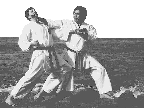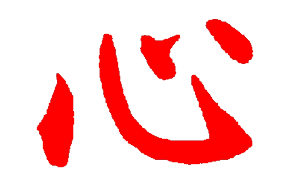The Meaning of Jikishin
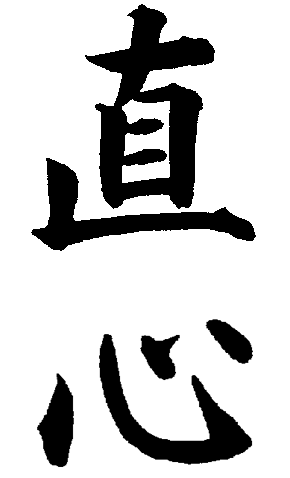 The
name of the Jikishin-Kai is derived from an old Japanese
proverb: Jikishin kore
dōjō
nari (直心是道場なり),
which translates roughly as "A pure
heart produces a
dōjō."
A kai (会) is a group, organisation, or
association. So the Jikishin-Kai
(直心会) translates as the Pure
Heart Association.
The JKI was founded as an international organisation for
the purpose of promulgating the forms of Nippon budō
(Japanese and Okinawan budō) taught by Shimabukuro
Hanshi, so as a Japanese translation of our name we
use Kokusai Nippon Budō Jikishin-Kai (国際日本武道直心会)—International
Japanese Budō Pure Heart Association.
The
name of the Jikishin-Kai is derived from an old Japanese
proverb: Jikishin kore
dōjō
nari (直心是道場なり),
which translates roughly as "A pure
heart produces a
dōjō."
A kai (会) is a group, organisation, or
association. So the Jikishin-Kai
(直心会) translates as the Pure
Heart Association.
The JKI was founded as an international organisation for
the purpose of promulgating the forms of Nippon budō
(Japanese and Okinawan budō) taught by Shimabukuro
Hanshi, so as a Japanese translation of our name we
use Kokusai Nippon Budō Jikishin-Kai (国際日本武道直心会)—International
Japanese Budō Pure Heart Association.
The concept of developing and maintaining a pure heart is the central aspect of every art and style we teach—arts that have their origins in the need to protect the lives, property and rights of the innocent and the productive for the good of society and humanity as a whole.
A
dōjō
is a "place of the Way
(of life)," meaning a place in which its members
actively and intentionally follow the Way of Life of a
bushi (see the description of Bushidō
in the next section). That Way of Life involves
developing the KSAs (knowlege, skills, and attitudes)
needed to overcome evildoers. But the KSAs capable
of overcoming evil are also capable of overcoming good,
which is why the foundation of our budō
training must be a pure heart—a heart
that is motivated by pure intentions and a desire to
serve others.
Being a member of the Jikishin-Kai International serves as a constant reminder that above all else a budōka must maintain a pure heart.

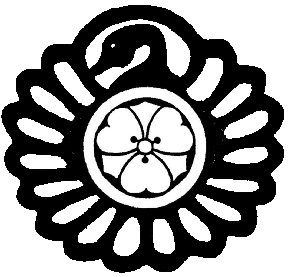
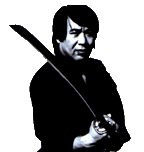 The
key elements of a pure heart (jikishin) can be found in
the
philosphy that is an essential part of the arts
we teach—arts that arose from the need to
protect private property and agricultural production
following the Taika land reforms implemented in Japan in 645 AD.
The bushi (武士) began as guardians of property
owners and farmers, the people whose work was vital to
their nation's survival. After a few centuries of
performing this role
the bushi were admitted into the samurai (侍)
class of Japanese society, and the characteristics of
the bushi and samurai became so
closely aligned and intertwined that the two groups became almost synonymous.
A thousand years of risking and sacrificing their lives
for the benefit of those unable to protect themselves
resulted in the development of a philosphy and code of
conduct that has become known around the world as Bushidō (武士道).
The
key elements of a pure heart (jikishin) can be found in
the
philosphy that is an essential part of the arts
we teach—arts that arose from the need to
protect private property and agricultural production
following the Taika land reforms implemented in Japan in 645 AD.
The bushi (武士) began as guardians of property
owners and farmers, the people whose work was vital to
their nation's survival. After a few centuries of
performing this role
the bushi were admitted into the samurai (侍)
class of Japanese society, and the characteristics of
the bushi and samurai became so
closely aligned and intertwined that the two groups became almost synonymous.
A thousand years of risking and sacrificing their lives
for the benefit of those unable to protect themselves
resulted in the development of a philosphy and code of
conduct that has become known around the world as Bushidō (武士道).